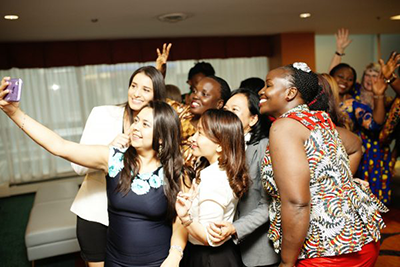
Facilitated by the Co-operative Development Foundation of Canada (CDFC), the Women’s Mentorship Program has been providing training for women credit union professionals around the world since 2002.
It matches participants with a credit union in Canada for 10 days, immersing them in the credit union and community, and offering general leadership training. Local credit union managers volunteer their time, training materials, transportation and accommodation for the overseas participants.
This year the program gave women from 14 countries training to strengthen their professional, technical and leadership skills. They heard from 12 different speakers, including two alumni of the program. Since 2002, the program has trained 254 women representing over 25 countries, and has benefited from the support of over 200 Canadian credit unions and hundreds of Canadian hosts.
Former participant Obenewaa Yeboah has improved practices at the small credit union she manages in Kumasi, Ghana. “With my credit union, Ramseyer, our challenge was dealing with loan delinquency and dormant accounts. As at the time of participating in the program, we had a delinquency which was above the standard rate of 5 percent,” she told CDFC.
“This rate has reduced tremendously to 1.96% as of July 2017. This great achievement by Ramseyer Credit Union was because we practiced what I learnt during the program,” she added.
Monicah Wanjiku Muiruri from Kenya, a 2019 participant of the Women’s Mentorship Program, added: “CDFC’s Women’s Mentorship Program transforms, enlightens, equips and empowers women leaders to be change agents.”
After they complete the program, participants carry out regular reviews looking at how they integrated what they learnt into their processes. Donna Miller, director of operations at CDFC, said many participants continue to interact with their hosting credit unions, sharing experiences or asking for advice.
In some countries, women credit union professionals have to overcome the barrier of being perceived as being responsible for domestic chores rather than earning an income.
“The mentorship program increases their confidence to be seen as leaders when they return to their country,” Miller said.
The program also aims to create synergies between public and private efforts to advance inclusive development.
“The Women’s Mentorship Program is a vibrant testimony to the power of leadership that was supported by the Canadian government, Canadian credit unions, private sector donors such as Fiserv, and regular Canadians, who provide a home and a family for our participants during their stay in Canada,” said Benoît André, executive director of CDFC. “We hope this program will continue to invest in women globally to impact change locally.”
Caroline Leclerc, assistant deputy minister at Global Affairs Canada, a government department that manages Canada’s diplomatic and consular relations, added: “The simple truth is that women can play important leadership roles in the economy, yet are underrepresented and face gender-based barriers. By working together, we can help remove these barriers. This is why the government supports initiatives such as the Women’s Mentorship Program.”


